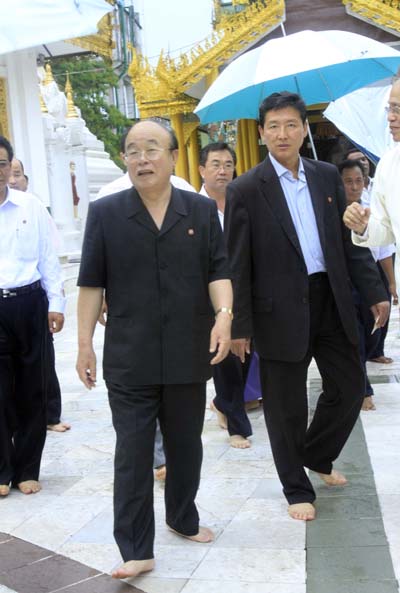Pak Ui Chun Arrives in Myanmar
DPRK Foreign Minister Pak Ui Chun arrived in Myanmar (Burma) on Thursday (29 July), and toured the Shwedagon Pagoda. This was the first visit by a DPRK Foreign Minister since the countries severed diplomatic relations in 1983 after the Rangoon bombing. The countries re-established formal relations in 2007. Irawaddy points out that former MOFA Vice Minister (and current CC KWP International Department Director) Kim Yong Il made the DPRK’s last official visit in November 2008.
AFP reports:
North Korea’s foreign minister arrived in Myanmar on Thursday for talks with the junta, an official said, amid Western concerns about possible nuclear cooperation between the two autocratic nations.Pak Ui Chun landed in Yangon, where he was expected to visit the Shwedagon Pagoda before travelling to the capital Naypyidaw on Friday to meet his counterpart Nyan Win, the Myanmar official said, asking not to be named.
Full details of Pak’s schedule were not immediately available, but he was expected to stay in the military-run state until Sunday.
Irawaddy reports on Pak’s arrival and about DPRK-Myanmar interactions:
North Korea’s last official visit to Burma was in November 2008, when Deputy Foreign Minister Kim Young Il and his Burmese hosts signed a free visa agreement for diplomats and official passport holders.
Pak was scheduled to tour the famous Shwedagon Pagoda in Rangoon before traveling on Friday to the ruling junta’s capital of Naypyitaw, where he will meet his Burma counterpart, Nyan Win, and other senior government officials, reported The Associated Press.
After Burma, Pak will fly to Indonesia for the Special Ministerial Meeting for the Millennium Development Goals, to be held on August 3-4 in Jakarta.
North Korea is one of Burma’s main military partners, supplying the Burmese regime with strategic weapons technology, such as missiles, rocket launchers and underground facilities. Recent revelations about a nascent nuclear weapons program in Burma have also raised concerns about possible involvement by Pyongyang.
As noted above, the DPRK and Myanmar have an ongoing relationship that includes military sales and exchanges, as well as technical and information exchanges. Irawaddy reported on the possibility that DPRK military advice now extends to mechanized combat, light infantry and civil defense.
The junta’s objective is better mobilization of light infantry troops and other lines of strategic defense such as artillery forces, air defense forces and missile forces, a source said.
“Like the the North Korean army, the junta wants the ability to deploy its forces, including multiple launch rocket systems, canons and air defense units, quickly to the front line. Then all would be re-deployed to bases in tunnels and caves,” said the source. “That’s why the junta is upgrading its vehicle depot forces.”
Sources said the junta upgraded its Motor Vehicle Depot Battalions in October 2009 to achieve the ability to rapidly deploy troops. The upgraded vehicle battalions are reportedly based in Shwe Taung in Pegu Division, Shwe Nyaung in southern Shan State, Taung Dwin Gyi in Magwe Division, Amarpura in Mandalay Division and Mingaladon in Rangoon Division.
The recent information from military sources provides more evidence of ties between Naypyidaw and Pyongyang, adding to that already available after a report was leaked in 2009 about a 2008 memorandum of understanding between the Tatmadaw and the Korean People’s Army covering joint military exercises and North Korean assistance in military training, air defense and constructing underground facilities and arms shelters.
The Burmese junta is tapping the North Koreans for more than just advice. They are also allegedly importing nuclear technology and strategic weapons such as anti-ship missiles, surface-to-air missiles, surface-to-surface missiles and multiple launch rocket systems for the Tatmadaw’s Air Defense and Missile forces.
![19087-7.[launched] Kim-Book-Cover](http://nkleadershipwatch.files.wordpress.com/2010/07/19087-7-launched-kim-book-cover.jpg)
Hein Latt's biography of North Korean leader Kim Jong Il has raised objections within Pyongyang's embassy in Rangoon. (The Irawaddy)
The Myanmar regime also quietly flexed its muscle on a Burmese biographer who wrote a book on Kim Jong Il. Hein Lett and his publisher turned over “several hundred copies” of his KJI tome to the DPRK Embassy (where he conducted research):
The author of a Burmese biography of North Korean leader Kim Jong Il and his publisher have handed over to the North Korean embassy in Rangoon several hundred copies of his book after embassy officials complained it contained inaccuracies.
The controversial book, “Kim Jong Il: North Korea’s Dear Leader,” was written by one of Burma’s leading biographers, Hein Latt. It was launched in Burma two months ago, but has sold few copies, according to Hein Latt.
“The North Korean Embassy called me and told me some facts in the book are not correct,” Hein Latt told The Irrawaddy on Wednesday.Hein Latt said the embassy had challenged “facts and structure related to the Korean People’s Army,” but had not identified the alleged inaccuracies.
Hein Latt said he had handed over his copies of the book to the North Korean Embassy to avoid any problems with the Burmese authorities.
Prior to his arrival in Myanmar, Pak Ui Chun visited Laos from 25 to 28 July. KCNA reported:
Talks between Pak Ui Chun, foreign minister of the DPRK, and Thongloun Sisoulth, vice-prime minister of the government of Laos and foreign minister, were held in Laos on July 26.
Present there from the DPRK side were the party of the foreign minister and the DPRK ambassador to Laos and from the Lao side officials of the Ministry of Foreign Affairs of Laos.
At the talks both sides informed each other of the situation in their countries and exchanged views on the issue of boosting the bilateral friendly relations and matters of mutual concern.
